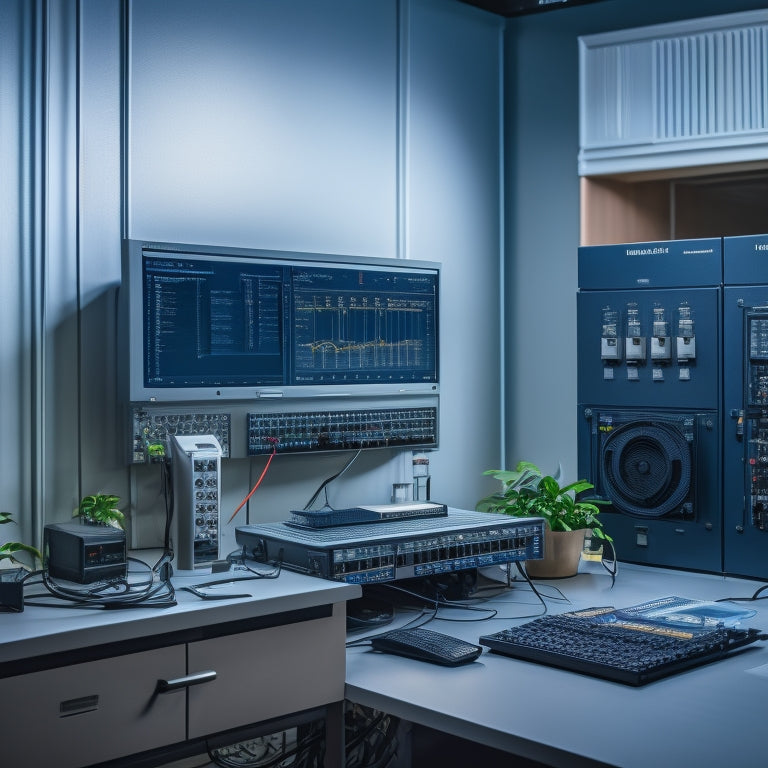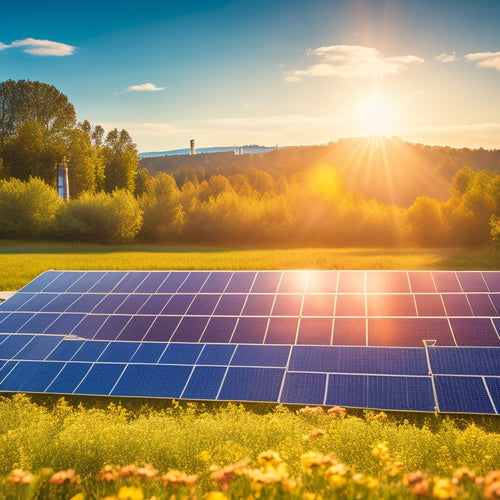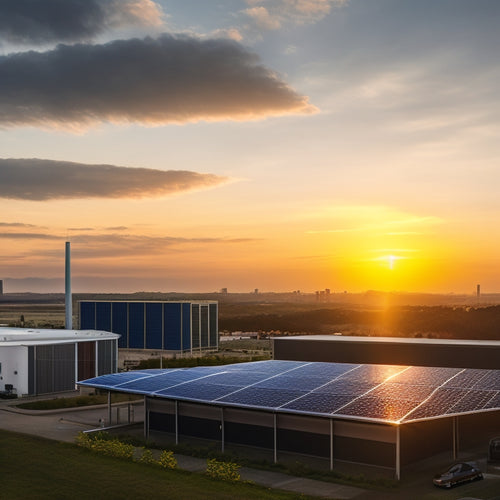
Maintaining Your Home Power System Effectively
Share
You've invested in a home power system, and now it's essential to guarantee it operates at peak performance to maximize energy savings and extend its lifespan. To maintain your system effectively, you'll want to understand your solar panel type's efficiency and durability, clean and inspect your panels regularly, and monitor performance metrics like voltage and power output. You'll also need to troubleshoot common issues like battery failures and inverter problems, and schedule professional maintenance to prevent costly repairs. By following these steps, you'll be well on your way to optimizing your home power system's performance - and there's more to investigate to get the most out of your investment.
Overview
- Regular cleaning and inspection of solar panels, inverters, and wiring prevent energy output reduction and ensure optimal performance.
- Monitoring key performance metrics like voltage, current, and power output helps identify issues and optimize energy usage.
- Troubleshooting common issues like battery failure, inverter faults, and wiring problems through regular checks prevents costly repairs.
- Scheduling professional maintenance based on system age, usage, and manufacturer recommendations ensures optimal operation and energy savings.
- Implementing a proactive approach to maintenance through regular checks and inspections prevents issues before they arise, minimizing downtime and costs.
Understanding Solar System Components
Efficiency begins with understanding. You've invested in a home power system, and now it's crucial to grasp the components that make it work.
Familiarize yourself with the different solar panel types, including monocrystalline, polycrystalline, and thin-film panels. Each type has its own strengths and weaknesses, affecting energy output and durability. For instance, high-efficiency inverters with an efficiency rating above 95% can greatly impact overall energy production inverter efficiency.
Next, understand the inverter functions, which convert DC power from your solar panels into usable AC power for your home. Inverters can be string, micro, or power optimizers, each with unique benefits and applications.
Regular Cleaning and Inspection
Every six months, you should inspect your solar panels to guarantee peak energy production. Cleaning techniques, such as soft-brush scrubbing and deionized water rinsing, help remove dirt and debris that reduce energy output.
| Inspection Frequency | Components to Inspect | Potential Issues |
|---|---|---|
| Every 6 months | Solar panels | Dirt, debris, and hotspots |
| Quarterly | Inverters and wiring | Loose connections, overheating |
| Annually | Mounting systems | Loose bolts, corrosion |
Regular inspection helps identify potential issues before they escalate, ensuring your home power system runs efficiently and effectively. By staying on top of cleaning and inspection, you'll enjoy reliable energy independence and minimize maintenance costs.
Monitoring Performance Metrics
You need to keep a close eye on your home power system's performance metrics to guarantee it's operating within ideal ranges. This involves performance tracking, which provides significant perspectives into your system's efficiency and productivity.
By monitoring key metrics such as voltage, current, and power output, you can identify areas that require improvement. Access to real-time data allows for remote performance monitoring and issue identification, and advanced data visualization tools track key performance indicators (KPIs) effectively.
Data analysis is essential in this process, as it helps you make sense of the collected data and make informed decisions. Regularly review your system's performance data to detect anomalies, optimize energy usage, and extend its lifespan.
Troubleshooting Common Issues
By analyzing your home power system's performance metrics, you've taken the first step in identifying potential issues. Regular monitoring of battery state of charge (SOC) and depth of discharge (DOD) can help prevent overcharging and undercharging, which can lead to battery failure battery monitoring and maintenance.
Now, it's time to troubleshoot common problems that can impact your system's reliability. Battery failure, for instance, can be caused by improper charging or deep discharging. Check your battery's state of charge, voltage, and temperature to diagnose the issue.
Inverter problems, such as faulty or loose connections, can lead to performance drops. Inspect your inverter's wiring and connections to confirm they're secure.
Wiring issues, like corrosion or overheating, can also cause performance drops. Perform a visual inspection of your wiring to identify any signs of damage or wear.
Scheduling Professional Maintenance
The reliability and efficiency of your home power system depend on regular professional maintenance. You can't afford to wait until something breaks down, as this can lead to costly repairs, safety hazards, and even power outages.
Instead, schedule regular maintenance with a licensed electrician to guarantee your system is running smoothly and efficiently. The maintenance frequency will depend on your system's age, usage, and manufacturer's recommendations.
Consider investing in service contracts, which can provide priority scheduling, discounted rates, and extended warranties. By staying on top of maintenance, you'll enjoy peace of mind, energy savings, and a safer living space.
Don't wait until it's too late – schedule your maintenance today and take control of your home's power system.
Frequently Asked Questions
Can I Install a Solar Power System Myself, or Do I Need a Professional?
You can attempt a DIY installation, but you'll need to take into account safety precautions, system efficiency, and local regulations to avoid voiding warranties or causing electrical hazards - it's often safer and more efficient to hire a professional for ideal results.
How Does a Power System Affect My Home's Resale Value?
You'll be surprised to know that 80% of homebuyers consider energy efficiency a top priority! Installing a power system enhances your home's resale value by meeting market demand, improving aesthetic appeal, and shaping buyer perception as a forward-thinking, eco-friendly haven.
Are There Any Government Incentives for Installing a Home Power System?
You're eligible for government incentives like the federal tax credit, covering 26% of your installation costs, and state rebates, varying by location, to offset the upfront investment in your home power system, giving you more freedom from utility bills.
Can I Use My Solar Power System During a Grid Outage?
You can enjoy grid independence during outages with a solar power system, but you'll need a battery backup and proper configuration to guarantee backup power flows safely and efficiently, giving you freedom from grid reliance.
Will a Solar Power System Work During Periods of Low Sunlight?
You're right to wonder if your solar power system will work during periods of low sunlight; fortunately, advanced solar efficiency and intelligent battery storage guarantee you'll still generate some power, albeit reduced, even on cloudy days.
Ready to Buy
You've taken the first step in maintaining your home power system effectively by reading this article. Now, it's time to put your knowledge into action. Remember, regular maintenance is key to optimizing your system's performance and extending its lifespan. Did you know that a well-maintained solar panel system can recover up to 95% of its initial performance after 20 years? By following these guidelines, you'll be well on your way to enjoying a reliable and efficient home power system for years to come.
Related Posts
-

Advantages of Solar Generating Systems Over Traditional Energy
Solar generating systems provide several key advantages over traditional energy sources. You'll experience lower long...
-

Key Components of a Reliable Emergency Power Supply System
A reliable emergency power supply system requires several key components. You need proven performance metrics to guar...
-

Advantages of Commercial Solar Battery On-Site Storage
By investing in a commercial solar battery on-site storage system, you can greatly reduce your energy grid dependence...


